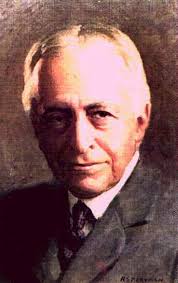“When studied with any degree of thoroughness, the economic problem will be found to run into the political problem, the political problem in turn into the philosophical problem, and the philosophical problem itself to be almost indissolubly bound up at last with the religious problem.” So wrote Irving Babbitt (1865-1933) in his influential book Democracy and Leadership (1924).
Babbitt was an important intellectual figure of the twentieth century and a powerful critic of utopian political agendas. He was a professor of French at Harvard, and among his students was the poet T. S. Eliot. Babbitt wrote seven rich, deep, and sophisticated books. Although discussed positively in Russell Kirk’s classic The Conservative Mind, he is largely forgotten today. He should not be. I regard Democracy and Leadership, along with Rousseau and Romanticism (1919), as his most important work. Late in life, he translated The Dhammapada, an early Buddhist ethical text, into English.
Babbitt’s overriding concern was what he saw as the West’s loss of standards. He thought that good human character and happiness could only be reached through self-restraint and humility. For Babbitt, humility involved looking up to a law that directed the higher, ethical will within man to refrain from the impulses and “expansive desires” of the lower, natural will.
Babbitt argued that the will’s primacy over both the intellect and the emotions was an Eastern notion brought to the Occident under the auspices of Christianity (a religion of the East, after all) and its doctrine of grace. He also thought that Christianity’s distinction between the things of Caesar and the things of God was an advance over the political philosophy of Aristotle and Plato, providing a basis for a sphere of personal liberty.
The West’s crisis of the loss of standards was brought about, in Babbitt’s view, by a turning away from Christianity. Babbitt and his New Humanism movement worked for the rediscovery of sound standards along modern, critical, individualistic lines. Himself an atheist or agnostic (I cannot tell which), he thought that the higher human will was a fact immediately experienced by human beings and the perception of it did not depend on metaphysical theory, religious authority, or cultural traditions.
Although he regarded Confucius, Aristotle, and Jesus as among the greatest moral teachers, for Babbitt the greatest exponent of the higher will as an immediately perceived fact was the Buddha. Babbitt believed the “smaller vehicle” form of Buddhism prevalent in in southeast Asia and Sri Lanka to be the most authentic.
In Democracy and Leadership, Babbitt was especially concerned with relating politics to the inner life of the individual, the working of the higher will. This inner working, to the extent that it is successful, results in inner peace and happiness. Babbitt thought much mistaken those “who hoped to renovate society by an ingenious manipulation of political machinery, and who had an almost unlimited faith in the efficacy of paper constitutions.”
Instead, he thought that societal improvement could be brought about by inner work of the higher will and the power of good example, especially the good example of political leaders. He was neither sanguine nor defeatist about the possibility of societal improvement.
Babbitt did not believe in abstract rights given to man anterior to any performance of duties. Thus he preferred the U.S constitution to the Declaration of Independence and the figures of Washington, Marshall, and Lincoln to that of Jefferson. [It is a complex and not entirely convincing argument, because the notion of rights, properly understood, has nothing to do with social improvement and everything to do with the fundamental nature of human existence and interpersonal relations, but it is a philosophically interesting discussion nonetheless.—Ed.]
Babbitt was no proponent of unbridled free markets; he saw the imperialism of the individual ego—the unbridled pursuit of one’s desires—as leading to plutocracy, but he saw no proper solution to it in socialism’s attack on private property and competition.
He saw the imperialism of the individual ego also as leading to imperialism in foreign affairs. (He gives as an example the U.S. occupation of the Philippines). Babbitt thought that peace was not a proper political goal—peace being instead an inner state of the individual in whom the higher will successfully works—but instead justice. He also has much to say about the quality and role of the imagination, comparing Edmund Burke very favorably to Rousseau.
In Democracy and Leadership and in his works overall, Irving Babbitt presents no easy answers to the problem of individual human happiness (he is no New Age guru), nor to the political problem of justice (he is no ideologue), but he does provide a path worth considering, especially for those who find themselves unable to put their trust in some external authority.



Shmuel, this is outstanding. I am one of those many who knew little about Babbitt other than his name, but I’m now inclined to seek him out. He sounds like a mystic to me, albeit a secular one.